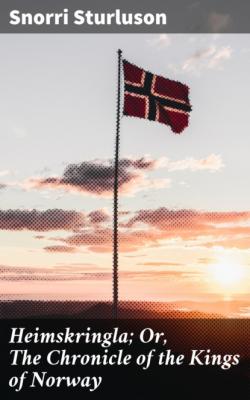Heimskringla; Or, The Chronicle of the Kings of Norway. Snorri Sturluson
Читать онлайн.| Название | Heimskringla; Or, The Chronicle of the Kings of Norway |
|---|---|
| Автор произведения | Snorri Sturluson |
| Жанр | Документальная литература |
| Серия | |
| Издательство | Документальная литература |
| Год выпуска | 0 |
| isbn | 4057664181701 |
"The wolf, the murderer, and the thief,
Fled from before the people's chief:
Few breakers of the peace grew old
Under the Northmen's king so bold.
When gallant Hakon lost his life
Black was the day, and dire the strife.
It was bad work for Gunhild's sons,
Leading their pack of Hungry Danes
From out the south, to have to fly,
And many a bonde leave to die,
Leaning his heavy wounded head
On the oar-bench for feather-bed.
Thoralf was nearest to the side
Of gallant Hakon in the tide
Of battle; his the sword that best
Carved out the raven's bloody feast:
Amidst the heaps of foemen slain
He was named bravest on the plain."
32. HAKON'S DEATH.
When King Hakon came out to his ship he had his wound bound up; but the blood ran from it so much and so constantly, that it could not be stopped; and when the day was drawing to an end his strength began to leave him. Then he told his men that he wanted to go northwards to his house at Alreksstader; but when he came north, as far as Hakonarhella Hill, they put in towards the land, for by this time the king was almost lifeless. Then he called his friends around him, and told them what he wished to be done with regard to his kingdom. He had only one child, a daughter, called Thora, and had no son. Now he told them to send a message to Eirik's sons, that they should be kings over the country; but asked them to hold his friends in respect and honour. "And if fate," added he, "should prolong my life, I will, at any rate, leave the country, and go to a Christian land, and do penance for what I have done against God; but should I die in heathen land, give me any burial you think fit." Shortly afterwards Hakon expired, at the little hill on the shore-side at which he was born. So great was the sorrow over Hakon's death, that he was lamented both by friends and enemies; and they said that never again would Norway see such a king. His friends removed his body to Saeheim, in North Hordaland, and made a great mound, in which they laid the king in full armour and in his best clothes, but with no other goods. They spoke over his grave, as heathen people are used to do, and wished him in Valhal. Eyvind Skaldaspiller composed a poem on the death of King Hakon, and on how well he was received in Valhal. The poem is called "Hakonarmal":—
"In Odin's hall an empty place
Stands for a king of Yngve's race;
'Go, my valkyries,' Odin said,
'Go forth, my angels of the dead,
Gondul and Skogul, to the plain
Drenched with the battle's bloody rain,
And to the dying Hakon tell,
Here in Valhal shall he dwell.'
"At Stord, so late a lonely shore,
Was heard the battle's wild uproar;
The lightning of the flashing sword
Burned fiercely at the shore of Stord.
From levelled halberd and spearhead
Life-blood was dropping fast and red;
And the keen arrows' biting sleet
Upon the shore at Stord fast beat.
"Upon the thundering cloud of shield
Flashed bright the sword-storm o'er the field;
And on the plate-mail rattled loud
The arrow-shower's rushing cloud,
In Odin's tempest-weather, there
Swift whistling through the angry air;
And the spear-torrents swept away
Ranks of brave men from light of day.
"With batter'd shield, and blood-smear'd sword
Slits one beside the shore of Stord,
With armour crushed and gashed sits he,
A grim and ghastly sight to see;
And round about in sorrow stand
The warriors of his gallant band:
Because the king of Dags' old race
In Odin's hall must fill a place.
"Then up spake Gondul, standing near
Resting upon her long ash spear—
'Hakon! the gods' cause prospers well,
And thou in Odin's halls shalt dwell!'
The king beside the shore of Stord
The speech of the valkyrie heard,
Who sat there on his coal-black steed,
With shield on arm and helm on head.
"Thoughtful, said Hakon, 'Tell me why
Ruler of battles, victory
Is so dealt out on Stord's red plain?
Have we not well deserved to gain?'
'And is it not as well dealt out?'
Said Gondul. 'Hearest thou not the shout?
The field is cleared—the foemen run—
The day is ours—the battle won!'
"Then Skogul said, 'My coal-black steed,
Home to the gods I now must speed,
To their green home, to tell the tiding
That Hakon's self is thither riding.'
To Hermod and to Brage then
Said Odin, 'Here, the first of men,
Brave Hakon comes, the Norsemen's king—
Go forth, my welcome to him bring.'
"Fresh from the battle-field came in,
Dripping with blood, the Norsemen'a king.
'Methinks,' said he, great Odin's will
Is harsh, and bodes me further ill;
Thy son from off the field to-day
From victory to snatch away!'
But Odin said, 'Be thine the joy
Valhal gives, my own brave boy!'
"And Brage said, 'Eight brothers here
Welcome thee to Valhal's cheer,
To drain the cup, or fights repeat
Where Hakon Eirik's earls beat.'
Quoth the stout king, 'And shall my gear,
Helm, sword, and mail-coat, axe and spear,
Be still at hand! 'Tis good to hold
Fast by our trusty friends of old.'
"Well was it seen that Hakon still
Had saved the temples from all ill (1);
For the whole council of the gods
